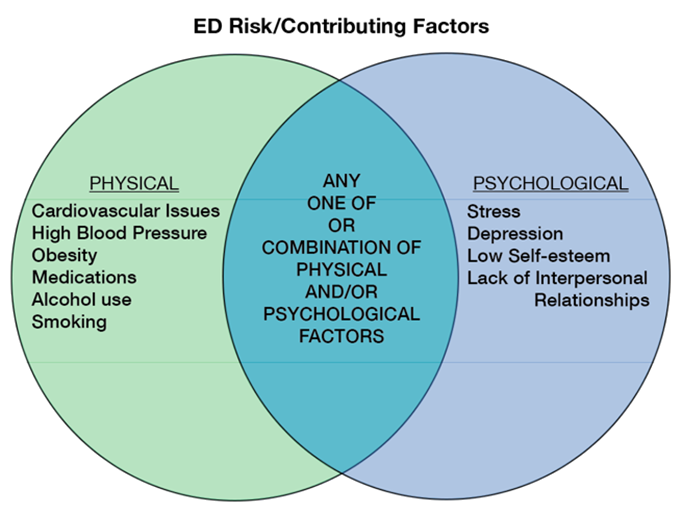How Does State of Mind Affect Erectile Dysfunction?
Awareness, discussion and treatment of erectile dysfunction (ED) and male performance have become much more mainstream due to the advancement of medications like sildenafil (Viagra™) and tadalafil (Cialis™).
Along with this, there has also been increased acceptance in recognizing, and seeking help for, mental conditions like depression. It is no surprise then that any exploration of what can be causing an ED condition in a patient should consider both their mental, as well as physical state when trying to determine the factors involved.
It's nothing new
Erectile dysfunction has been an issue in every culture throughout recorded history. Whether you were a man from India in the 8th century BC, or a Roman living in the 8th century AD, or a Chinese man living thousands of years ago, one thing that would happen to a certain percentage of you was the inability to get and keep an erection hard enough, and long enough to have sex to the satisfaction of both your partner and yourself. From commoners to kings, ED has affected lives in ways to inspire the search for both a cause and a cure.
In India (8th century BC), doctors theorized that the cause of ED was from having sex with “undesirable” women, and prescribed herbal/animal compounds as a cure. Ancient Egyptians blamed ED on an evil spell, to be cured by crushing the hearts of baby crocodiles and rubbing the remains on the penis with a lotus flower. In ancient Rome and Greece, they were less concerned about the cause (although horseback riding was suspect), than the cure which included both plant concoctions and talismans.
The point is, ED has been taken seriously for some time. In 16th and 17th centuries France impotence was actually considered a crime, and was legal grounds for divorce. This did, however, require an inspection of the parties by the court, and was finally declared obscene in 1677. The result of not understanding ED the way we do today, was that men would often resort to bizarre and sometimes even harmful treatments, in order to overcome it.
What's the problem?
Throughout most of history, things credited for causing of ED ranged ran the spectrum from physical to metaphysical to mental. From low sperm count caused by masturbation, to evil spells, to guilt from sin and moral failure. However, by the early 20th century, medical anecdotes concluded that the vast majority, over 90%, of ED cases were psychologically based. There was a deviation from this thinking in the 1920s and 30s, when the developments in endocrinology suggested more physically-related causes. Consensus then went back to psychological causes until the 1980s, when modern research, along with the development of drugs to treat ED, shifted the focus almost completely to physical causes and treatment of them. But what about the mental aspects of ED?
The problem is that ED is not always an “either-or” condition. Just as there are multiple factors that can contribute to it physically – cardiovascular issues, high blood pressure, obesity, medications, alcohol use, smoking – there are also multiple psychological factors that can play a part – stress, depression, low self-esteem, inadequate interpersonal relationships. The truth is, your mental state can contribute as much, or more, to erectile dysfunction as your physical health.


ED that’s not related to organic, or physical, factors is referred to as “psychogenic”. The International Society of Impotence Research defines psychogenic erectile dysfunction as the inability to achieve or maintain an erection for sex due primarily to psychological or interpersonal factors. It often coexists with other sexual dysfunctions and major psychiatric disorders such as depression and anxiety.
It's bigger than you think
By 2025, it’s estimated that ED will affect over 300 million men worldwide. It currently affects an estimated 30 million men in the U.S., with approximately 25% of new cases affecting men under the age of 40. Depending on the study and the criteria used, the number of ED cases that can be considered psychogenic range from 10% to 40%. This makes sense when considering the relatively large number of men under 40 who experience some form of ED, as those cases are not likely to coincide with the age-related factors that typically contribute to ED in an older demographic. It has also been estimated that up to 75% of ED cases go untreated.


Of the large number of cases within this data set, it can be inferred with some confidence that both physical and psychogenic ED cases often overlap in their causal factors.
Is your ED psychogenic?
A good place to start to answer that is by eliminating some of the common physical factors. If you have no cardiovascular issues, diabetes, high blood pressure, are not obese, and do not smoke or use alcohol excessively – basically, if you are in relatively good physical shape – but are having erectile dysfunction issues, then it may be psychogenic. And to explore that further requires a deeper look into your personal life and history.
In assessing your psychological state, you need to consider:
- Depression – have you had bouts with depression in the past, or do you feel in an overall depressed state much of the time?
- Lethargy – are you tired a lot of the time? Do you lack energy that you used to have? If so, is it related to a state of mind or a lack of sleep? Or both?
- Insomnia – do you have trouble sleeping when you want to, even when you’re tired?
- Loss of libido – have you experienced a noticeable decrease in your desire for sex?
- Stress – are you stressed out a lot? Work, finances, family, health, and relationships can be sources of stress.
- Relationships – is there tension in a relationship? Is it related to sex?


In considering these things, it can also be helpful to look at them in relation to any specific events in your life. Did your ED start with any particular incident? Things such as divorce, major medical events, deaths, job loss and accidents can cause trauma, and even post-traumatic stress, that can contribute to psychogenic ED.
Avoiding the cycle problem
Besides just the problem of erectile dysfunction itself, another aspect of psychogenic ED to be aware of is the cycles that can be created within the problem itself, exacerbating and creating an endless loop that can be hard to break from.
For example, if a problem starts in a relationship, because of ED, ongoing ED will keep extending that problem within the relationship. That can also lead to stress, which leads to anxiety, which leads to more stress, which leads to more erectile dysfunction. The same is true for most of the factors involved in psychogenic ED. Depression, which can initially cause psychogenic ED, can lead to more depression because of the ED, and the cycle continues. Low self-esteem can become a self-fulfilling prophecy, as negative self-talk and lack of confidence can lead to more of the same.
Being aware of this dynamic is the first and possibly most important step in avoiding or breaking these cycles. Combined with treatment, there are ways to overcome the problem.
How is psychogenic ED treated?
Treatments for psychogenic ED include:
- Therapy – individual counseling and even psychotherapy
- Couples or relationship counseling
- Meditation and relaxation techniques
- Anxiety reduction training
A National Institutes of Health study found that these traditional approaches for psychogenic ED treatment were being increasingly combined with traditional drug prescription therapy such as sildenafil (and tadalafil). Other studies have also found that the introduction of this type of pharmacologic therapy can sometimes help break a cycle in which the patient finds themselves stuck.
ED treatment today
You could say that getting medical treatment for erectile dysfunction (ED) has never been easier.
Sildenafil (the active ingredient in Viagra™) and tadalafil (the active ingredient in Cialis™), the two most widely tested and effective drugs for treating ED, became available roughly twenty years ago, and require a prescription. While it used to require an appointment and physical visit to a doctor’s office, telemedicine has all that. As a leading telemedicine company, Riize Health makes it as easy as a few clicks to qualify for a prescription from a licensed physician, in the privacy of your home. Riize has combined both sildenafil and tadalafil (plus oxytocin) in fast-acting, oral dissolving Riize Strips. Dissolving on the tongue, the effects of Riize Strips are quickly noticeable: 90% of the active ingredients get absorbed directly into the bloodstream up to 5x times faster than other products. All three ingredients, in a technically advanced oral strip, is a first for an ED formula and delivery method.
At the same time, At Riize Health, we understand the importance of personalized care. That’s why we provide a platform where patients can easily consult with healthcare professionals remotely. Through video or phone calls, individuals can discuss their symptoms, receive accurate diagnoses, and obtain personalized treatment plans that address their specific needs. Regardless of the sources and causes of your ED, Riize is here to give you every advantage to overcome it.


SOURCES
- https://www.ncbi.nlm.nih.gov/pmc/articles/PMC5675239/
- https://en.wikipedia.org/wiki/Erectile_dysfunction
- https://www.doctorfox.co.uk/news/erectile-dysfunction-a-brief-history
- https://www.thelancet.com/journals/lancet/article/PIIS0140-6736(07)61324-5/fulltext
- https://emedicine.medscape.com/article/444220-clinical?form=fpf
- https://www.nature.com/articles/3900717
- https://www.news-medical.net/health/Sexual-Dysfunction-History.aspx
- https://gainswave.com/history-of-erectile-dysfunction-and-some-of-the-bizarre-treatments-used
- https://www.hopkinsmedicine.org/health/conditions-and-diseases/erectile-dysfunction
- https://www.urologic.theclinics.com/article/S0094-0143(05)70137-3/abstract
- https://pubmed.ncbi.nlm.nih.gov/11402580
- https://www.verywellhealth.com/psychogenic-erectile-dysfunction-5201654





